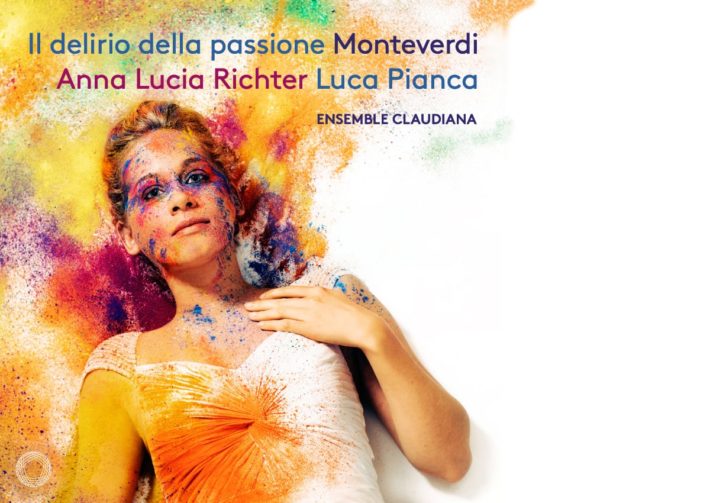Claudio Monteverdi is often regarded as the father of opera; his Orfeo (1607) is considered the first major example of the genre. As pioneering a work as it is, it also reflects the Renaissance’s fascination with reviving the stories and structure of Ancient Greek drama. In her new release, “Il delirio della passione”, soprano Anna Lucia Richter collaborates with Ensemble Claudiana to present a selection of the composer’s opera arias, madrigals, canzonettas, and sacred works.

In the Prologo from Orfeo (track 1), Richter’s light and supple voice provides a melodious contrast from the instrumental episodes, whose vitality can be first heard in the crisp tambourine. There is a pleasing variety across each of the vocal solos as well – some are extroverted while others, like the final words, are barely above a whisper. Monteverdi uses the “plucked” instruments in two capacities: the harpsichord provides rhythmic support as part of the basso continuo; the theorbo (a lute-like Baroque instrument) takes on a sprawling, improvisatory role as it accompanies the vocal line.
The sprightly Zefiro torna (track 2) relies on a recurring imitative pattern to integrate the voice with the instruments. The dotted note figures add an invigorating feel to the idyllic scene described in the lyrics. Along the same lines, Monteverdi also uses the theorbo as a programmatic vehicle: with a more distinctive twang than the harpsichord, it adds a rustic touch. The recitative that appears later in the song gives us a moment of peaceful reflection amidst the liveliness. The addition of the countertenor, whose timbre is a bit denser, creates nice depth too.
The elegiac Lamento d’Arianna (track 4) is quite lovely. The strings establish the mood through rich, sostenuto playing in their opening interlude which sees a transition from A minor to C major and back. The performers use this shift to introduce an emotional narrative even before the soloist enters. And when she does, she emphasizes the dissonances to bring out their poignancy. With an excellent control of vibrato (for instance, adding it mid-note), she also heightens tension in the most opportune moments. (If we’re going for comparisons here, another wonderful performance is Anne Sophie von Otter’s 1998 recording on Deutsche Grammophon. A slightly less effusive approach reveals the more contemplative side of the lament.)
O Teseo Mio (track 5) continues in the vein of having a less dense accompanimental texture, which spotlights the singer’s expressive capabilities. While this song largely revolves around a theme of opposites, there is much more offered in the performance. When Arianna asks Theseus to return, Richter combines an impassioned outburst with a heartfelt plea, thanks to some nuanced voice inflections. In quieter moments like 1:43-2:02, remorse is coupled with a gentleness, making the protagonist’s sadness all the more intense. The accompaniment, however sparse, contributes significantly: translucent, arpeggiated filigrees give just enough body to the voice while helping to enhance the solitary nature of the monologue.
Ohimè ch’io cado closes the album in virtuosic fashion. The cornetto, popular during the Renaissance, features prominently – although it is a wind instrument, it has an intriguing sound profile that resembles a lighter version of the trumpet. Some of its solos, with their repetitive motifs, are symbolic of the song’s message about stumbling and slipping repeatedly into the world of love. Others have a lighthearted spontaneity that matches well with the work’s not-overly-serious character. As for the singing, Richter adds elegant ornaments and runs in repeating portions of stanzas which bring out the silvery quality of her voice.
Recorded at the Auditorio Stelio Molo in Lugano, the album has a sound engineering that tempers the vocal brightness with softer ensemble timbres. At times, the microphones do seem a little up-close, and the airiness of certain textures might be better presented with a greater cushion of space. However, we can still appreciate the intricacy of different lines connected through Monteverdi’s masterful polyphony. The descriptive liner notes, written by Ensemble Claudiana’s director (who also features as the lutenist), make for a perfect addition.
This diverse collection offers some of Monteverdi’s finest works, making it just as suitable for an enthusiast as someone less familiar with the range of his output. All around, an enjoyable listen – and recommended without reservation.
Recommended Comparisons
von Otter | Savall | Koehler | Janowitz
“Il delirio della passione” – Arias by Monteverdi
Anna Lucia Richter – Soprano
Ensemble Claudiana
Luca Pianca – Conductor



















